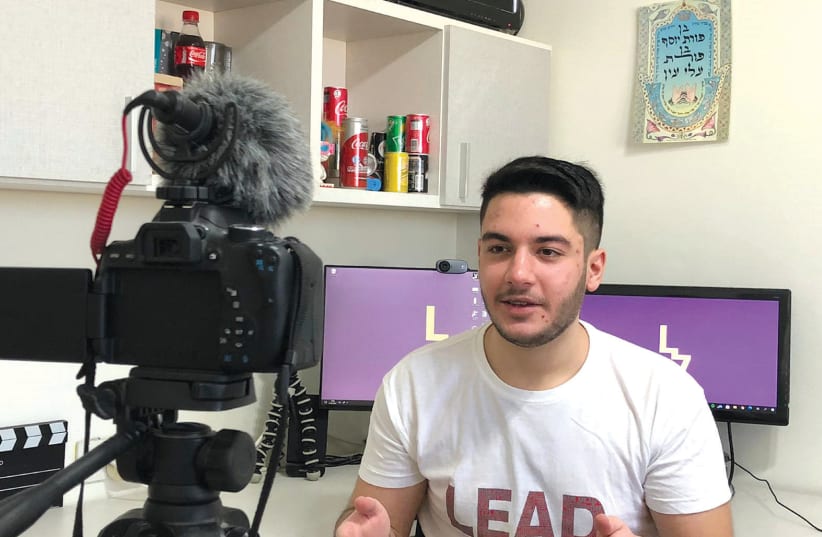Some take on a one-week challenge, filming themselves performing in English and sharing the results online before they get access to more challenging content. This can be as varied as holding a conversation in English while playing a video game with non-Israelis.
One platform already being used in an educational manner allows players to locate other gamers wherever in the world they might be. It’s called Halexicon, and it was created by a teenager named Roey Siman Tov.
Teenagers already spend a great deal of time on social networks and playing video games. Not only does Halexicon “hack” these existing trends to teach new skills, it also touches on an important aspect of English as a global language. If a generation ago Israeli children would be sent to summer camps in the UK to learn from native speakers (top-down learning), here they are encouraged to use English to speak to a gamer in Spain or India during a common online activity (vertical learning). This helps to reduce the social fear of sounding foolish in front of someone who (allegedly) inhabits that culture. If a Russian teenager and an Israeli teenager speak English with a slight accent or make some grammatical mistakes, neither of them is bothered.
Siman Tov, who is now graduating Ziv High School in the Beit Hakerem neighborhood of Jerusalem, is the public face of Halexicon, and appears in many of its short video-challenges. He is also a participant in LEAD, a nationwide program that seeks to offer talented young people years of guidance to cultivate their leadership skills and abilities. Siman Tov realized that many of his peers shared the same social anxiety when it came to speaking English.
“We could ace the English exams and get an A,” he said, “but would be too scared to open our mouths and speak.” Siman Tov knew he had some technological talent. He and his team won the 2020 Data-Thon, a Jerusalem-based one-day challenge to answer educational needs with innovative technology. He also knew that good leaders search for quality feedback, and so he turned to his English-language teacher, Hotam graduate Esti Rosekind Peled.
“This situation, of being nervous when speaking a new language, isn’t unique to Hebrew speakers who learn English,” Rosekind Peled said. “I taught Hebrew in the US, and Americans feel the same way when they are asked to respond in Hebrew.
“Teenagers are exposed to English on many levels,” she pointed out. “But at that age, they also care deeply about how they are perceived socially by others. Roey was able to overcome that difficulty.”
IN THE SAME way that a one-week challenge built from small chunks of moderate exercise can help people who are out of shape learn new habits and outlooks, Siman Tov’s program offers a path to greater English mastery. The analogy works on other levels as well. Rosekind Peled is the trainer, in this case, offering a pedagogical aspect to what appears to be purely social or fun. And just as a one-week work-out challenge is meant to inspire people to continue, so does this plan.
“I believe in the concept of youth-to-youth education,” Siman Tov said, “meaning teenagers are able to bring more motivation and effort to the table when there aren’t adults in the room bossing them around.”
Eliav Zakay, LEAD CEO for 21 years, thinks most people get the topic of leadership wrong.
“You don’t learn how to be a leader by reading about great leaders and discussing their lives,” he said, as that is an academic direction. “Nor do you become a leader by taking a one-week or one-month workshop,” as interesting and rewarding as these short-term experiences might be. “The focus must be on processes. The student must know him or herself and what set of abilities they already have.”
The program is an invitation to a two-year process during which participants not only learn what their identity is as leader, but also how to look “inward and outward.” Zakay pointed out that being a leader has various costs as well. “It’s much more than picking up a set of skills,” and this aspect is also covered.
The program is not an ideological one, and LEAD graduates like Siman Tov went on to do various different projects with the skills they gained. Krembo Wings, a youth movement focused on the integration of kids with special needs, was created in 2002 by LEAD graduate Adi Altschuler. Yasmeen Abu-Fraiha, who created GENESIS, an NGO devoted to preventing genetic disease in the Middle East, with a focus on Israel’s Bedouin community, is another graduate.
“Today, knowledge is floating in the air,” Zakay says. “What kids need from adults isn’t so much knowledge, as for us to serve as role models and offer guidance and feedback.”
Roey Siman Tov is currently looking for seven teenagers, ideally based in Jerusalem, who will help him lead Halexicon and expand it. Those taking part in the project will be able to learn from him and will receive academic points (five units) for volunteering.
Halexicon can be visited at: vm.tiktok.com/ZSw8abaJ/

